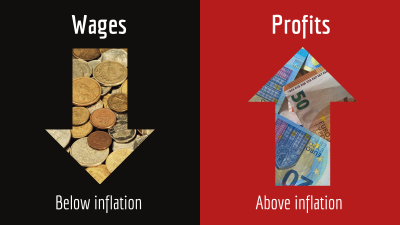The pay of European workers is still falling in real terms despite corporations making above-inflation profits, new research by the European Trade Union Confederation (ETUC) has found.
Across the European Union, the value of wages has fallen this year when inflation is taken into account. By contrast, company profits have increased by nearly 2 per cent in real terms.
Real pay is falling while real profits is rising in nine member states, including Germany, France and Italy. In a further 10 member states, increases in real profits are higher than increases in real wages.
The biggest increases in real profits came in Slovakia (+8%) and Romania (+7%), where real wage growth is negative. The biggest decreases in real wages came in Czechia (-5%) and Italy (-2%), where profits have increased in real terms.
Member States where real wages are falling despite real profits increasing:
|
|
Change in real wages 2023 (%) |
Change in real profits 2023 (%) |
|
Czechia |
-4,6 |
5,4 |
|
Germany |
-1,3 |
1 |
|
Greece |
-0.2 |
5,9 |
|
France |
-0.2 |
1,4 |
|
Italy |
-2,3 |
1,3 |
|
Romania |
-0,2 |
6,9 |
|
Slovakia |
-1,1 |
7,9 |
|
Finland |
-0,3 |
0,1 |
|
Sweden |
-1,9 |
0,1 |
|
EU |
-0,7 |
1,5 |
|
Eurozone |
-0,2 |
1,9 |
The ETUC is publishing the analysis ahead of the launch of its European election manifesto, ‘Delivering a fair deal for workers’, in the European Parliament on Wednesday afternoon.
The figures show how working people are still being made to pay the price of an inflation crisis caused primarily by corporations taking advantage of supply issues to increase their profit margins.
Profit share has increased across the EU by 4% since the start of the pandemic and dividend payments to shareholders are rising up to 13 times faster than pay across the EU.
Meanwhile, child poverty has increased across the EU for the third consecutive year as the price of the most basic food stuffs continues to rise up to seven times faster than pay.
The ETUC European election manifesto calls on politicians to support the following policies:
- Windfall taxes on the excess profits which have driven inflation.
- A revision of the directives on public procurement which makes access to public funding for companies dependent on respect for the right to collective bargained wages.
- An ambitious transposition of the Directive on Adequate Minimum Wages at national level, targeting 80% collective bargaining coverage in every member state.
ETUC General Secretary Esther Lynch said:
“Since the pandemic, the pay packets of European workers have been shrinking despite corporate profits ballooning. CEOs and shareholders have got richer while people working long hours in tough jobs struggle to feed their families and warm their homes. Despite that, many policymakers have made working people pay the price of this crisis.
“The European elections must be a turning point. It’s time for policies which address the number one cause of this crisis – corporate greed – and deliver a fair deal for working people.
“We call on democratic European political parties to ensure that the far-right is not given the opportunity to exploit growing anger. The only way to do that is to offer real solutions to the cost-of-living crisis and start building a Europe based on great jobs and high living standards for all.”
Notes
ETUC European election manifesto
Source for date: European Commission AMECO Database. Excel file with full data.

